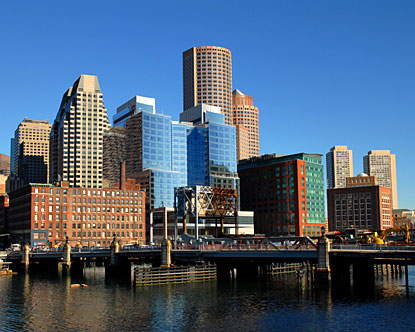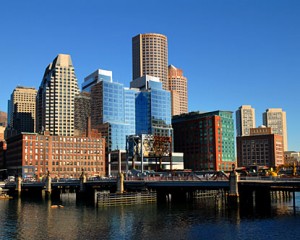Boston is a city with a vision for a brighter, greener future with more reliance on cleaner renewable energy and a premier destination for those who share that vision. One could call it a solar powerhouse.
An innovative plan was set in motion – a $550,000 initiative – to increase the amount of solar energy used by the city of Boston from one and a half megawatts at present to twenty-five megawatts by the year 2015. It has become one in thirteen of the U.S. Department of Energy Solar City Partners with encouragement from organizations such as the Boston Area Solar Energy Association and the Solar Energy Business Association of New England.

The Boston Area Solar Energy Association works to promote sustainable energy technologies. It serves to provide a forum to discuss and educate others about sustainable energy resources.
The Solar Energy Business Association of New England is an association of New England companies who promote the use of photovoltaic technology and the solar power industry.

The Boston Solar Company is a member of both organizations.
What is Photovoltaic Technology?

Simply put photovoltaics is the science of converting solar power into usable energy employing photovoltaic arrays made up of an interconnected system of solar panels. Since pure silicon is not electrically active the technology takes advantage of impure silicon crystals that serve to both attract and lose electrons. Photons from the sun knock electrons loose, creating an electrical current. Photovoltaic cells are the smallest semi-conductive elements used to harness sunlight and convert it into solar electric power.
A photovoltaic array also depends on other elements to provide adequate power to a home or business. These include:
· a power inverter
· a battery bank
· a system and battery controller
· auxiliary energy resources
· balance of system hardware including wiring, over-current, surge protection, and power processing equipment
What are some of the benefits of using a solar electric energy system?
Photovoltaic systems require no other fuel but sunlight to operate and do not release anything harmful into the atmosphere making it environmentally friendly fuel for Massachusetts. The cost of the solar panels might be steep, but it is a one-time fee and can save Boston residents in the long run because the energy comes free and the money saved can be diverted into other areas instead of a costly energy bill, sparing the pocket books of consumers as well as the beauty of the New England countryside.

Power outages will cease in the future to be a problem since – unlike conventional energy – one can store solar energy for future use, ensuring a convenient power supply twenty-four hours a day. The cost of maintenance is next to nothing and little effort is required to keep them operating. The only problems that could occur are due to water damage to the panel, the sealant, or the connections. Massachusetts consumers can avoid these problems by carefully adjusting the panel so that water doesn’t collect on the frame. A professional installer, such as Boston Solar, will ensure proper panel adjustment to minimize water damage. A panel that is well maintained, kept clean and dry (doesn’t retain standing water), remains reliable and ensures efficient energy output.
What about the cost of solar panels?
Some Boston consumers can pay up to thirty thousand dollars for a solar energy system. It can save them money in the long-run, but what about the present? Not everyone can afford the exorbitant cost of a photovoltaic array. However, in some areas of New England it is possible to rent or lease solar panels at a price equal to or less than an average utility bill. With a monthly rate locked in consumers save money when energy costs rise while doing their part to reduce greenhouse gasses and a carbon footprint.
Are there other financial incentives?
In 2009 the American Recovery and Reinvestment Act extended consumer tax incentives, including tax credits to consumers who install efficient renewable energy systems in their homes – a thirty percent tax credit – by December 31, 2016.
In a world seeking cleaner more efficient sources of energy the city of Boston, Massachusetts is at the forefront of an energy revolution. Its sense of innovation serves as a glimpse into a future with a more reliable and renewable energy resource that is solar electric power.

 Follow
Follow